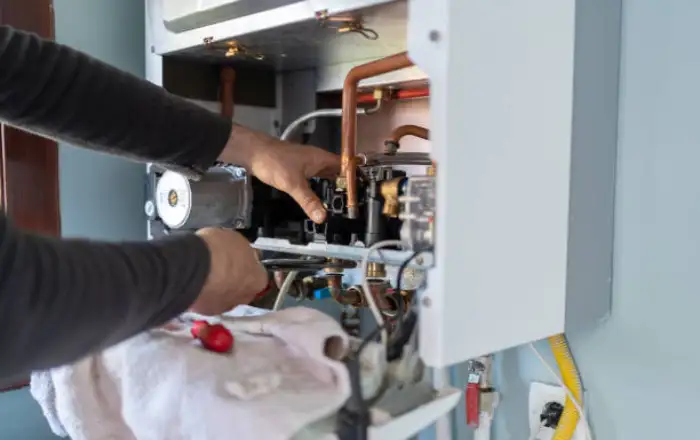Gas boilers are a common and efficient way to heat homes, but they can pose significant risks if not properly maintained. Poorly maintained boilers can lead to devastating consequences, including carbon monoxide poisoning, explosions, and fires, which can have a profound impact on families. As a homeowner, it is essential to understand the importance of regular inspections to prevent such hazards. By understanding what goes into an exhaustive inspection, you can take proactive steps to safeguard your family’s well-being and safety. But what exactly does a thorough inspection entail, and what should you expect from a certified technician?
The Importance of Regular Inspections
Regular gas boiler inspections are crucial for guaranteeing the safe, efficient, and reliable operation of these systems. A thorough gas boiler inspection involves a meticulous examination of the boiler’s internal components, including the combustion chamber, heat exchanger, and burner assembly. This process helps identify potential issues, such as soot buildup, corrosion, and faulty electrical connections, which can compromise the system’s performance and pose a risk to occupants. By performing regular inspections, homeowners can prevent unexpected shutdowns, reduce energy consumption, and extend the lifespan of their boiler. A gas boiler inspection should be performed annually by a certified technician to guarantee the system operates within manufacturer-recommended parameters.
Hazards of Poorly Maintained Boilers
A poorly maintained gas boiler poses significant risks to the health and safety of building occupants, as well as the integrity of the surrounding structure. Carbon monoxide poisoning is a major concern, as faulty boilers can produce this deadly gas. In addition, improperly functioning boilers can lead to explosions, fires, and scalding. Regular boiler inspections are vital to identify potential issues before they become major hazards. A thorough boiler inspection can detect problems such as corrosion, leaks, and malfunctioning safety devices. By identifying these issues, necessary repairs can be made to prevent accidents and guarantee a safe and efficient heating system. Regular maintenance and inspections can help mitigate these risks and provide peace of mind for building occupants.
Signs of a Faulty Boiler System
Identifying the signs of a faulty boiler system is key to preventing the hazards associated with poorly maintained boilers. A faulty gas boiler can exhibit various warning signs, including unusual noises, leaks, and fluctuating temperatures. If your boiler is producing a loud banging or clunking sound, it may indicate a blockage or malfunction in the system. Additionally, visible signs of corrosion, rust, or water leaks around the boiler or pipes can signal a potential issue. In some cases, a faulty boiler may also display error codes or warning lights on the control panel. If you notice any of these signs, it is essential to consult a qualified professional who specializes in gas boiler installation and maintenance to inspect and repair your system. Look at this website to discover gas boiler inspection and installation service in Poděbrady and Prague.
Steps to Take During an Inspection
Inspecting a gas boiler system requires a methodical approach to guarantee all critical components are evaluated and potential issues are identified. This involves a thorough examination of the entire gas boiler installation, including the boiler itself, pipes, and associated equipment. The inspection should focus on signs of wear, corrosion, and damage, as well as proper venting and combustion air supply. All connections, including gas and water lines, must be checked for leaks and damage. Additionally, the boiler’s electrical components, such as thermostats and circuit boards, should be inspected for proper function and any signs of wear. A thorough inspection will help identify potential hazards and confirm safe and efficient operation of the gas boiler installation.
How Often to Inspect Your Boiler
Regular gas boiler inspections are crucial to guarantee the safe and efficient operation of the installation. In Prague, for instance, local regulations may specify the frequency of inspections, but as a general guideline, it is recommended to have your boiler inspected at least once a year. This frequency may vary depending on the age and condition of the boiler, as well as usage patterns. For example, if the boiler is older or used extensively, more frequent inspections may be necessary. It is also recommended to inspect the boiler after any extended periods of non-use or when maintenance has been performed. Additionally, if any issues or concerns arise, an inspection should be conducted promptly to prevent potential hazards. Always consult local regulations and manufacturer guidelines for specific inspection requirements.
Conclusion
Regular gas boiler inspections are vital for ensuring the safe operation of the system. Annual inspections by certified technicians identify potential hazards, extend the system’s lifespan, and reduce energy consumption. Maintaining a well-functioning boiler system is essential for safeguarding family well-being and safety. Failure to conduct regular inspections may result in catastrophic consequences, including carbon monoxide poisoning, explosions, and fires. Scheduled inspections mitigate risks, provide peace of mind, and optimize system performance.

